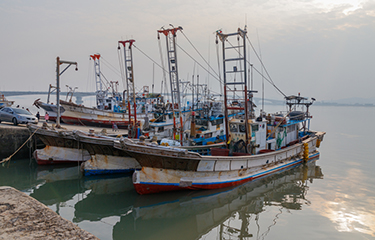In 2017, two South Korean vessels were caught fishing illegally and violating conservation measures in the region governed by the Commission for the Conservation of Antarctic Marine Living Resources, but were not sanctioned and instead were allowed to sell their fish on the international market.
The incident brought rebukes from other countries, including the United States, and prompted South Korea to revise its Distant-Water Fisheries Development Act to enable regulators to speedily and efficiently implement sanctions against vessels – an effort encouraged and praised by international and Korean NGOs, including the Environmental Justice Foundation.
But those same NGOs are now warning that the minister who oversaw Korea’s overseas fisheries during the Antarctic incident is currently running the country’s National Fishery Products Quality Management Service.
Since the 2017 incident, no other Korean vessels have been caught fishing illegally in the CCALMR region, though new violations may still come to light.
"We were told that there is one recent 'pending' case in the same CCAMLR area, but we are still waiting for the full report to come out," Hanmin Kim, a campaigner in the Environmental Justice Foundation's Seoul office, told SeafoodSource.
South Korea has made attempts to clean up its fishing fleet. Though the E.U. levied a yellow card warning against Korea in 2013, the warning was lifted in 2015. And, in 2018, South Korea became the first country that had been previously issued a yellow card by the E.U. to sign a joint statement with the E.U. committing to fight illegal fishing.
But last year, the U.S. put South Korea on a preliminary list of countries fishing illegally – a move that could result in trade sanctions against Korean exports. NGOs have called for fisheries governance to be subjected to greater transparency. In particular, Hanmin said that transparency measures should include the government annually publishing online the administrative sanctions it imposes, publishing the license list of Korean distant-water fishing vessels, and a requirement that vessels applying for distant-water fishing licenses have International Maritime Organization numbers.
Korea is one of five countries responsible for 90 percent of distant-water fishing effort, and its 221 licensed distant-water fishing vessels export about 200,000 tons per year. The country is active in the Antarctic, and has the largest number of vessels – nine – that are allowed to fish in the CCALMR region.
CCAMLR governs the Antarctic with a greater focus on preserving marine resources – and less with a focus on commercial activity compared to other RFMOs, according to Hanmin. So NGOs are pushing for tighter conservation measures, including designating more marine protected areas.
"What we are doing is trying to make sure that there is no Korean vessel that commits IUU fishing again in the Antarctic," Hanmin said.
Photo courtesy of Myungku Kim/Shutterstock







